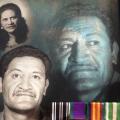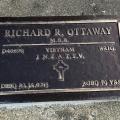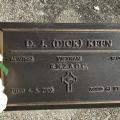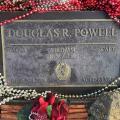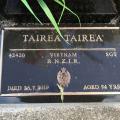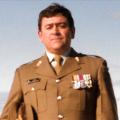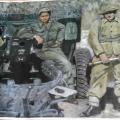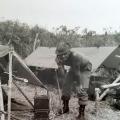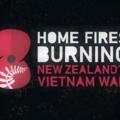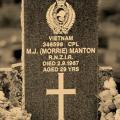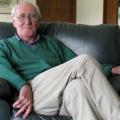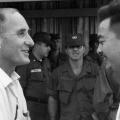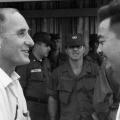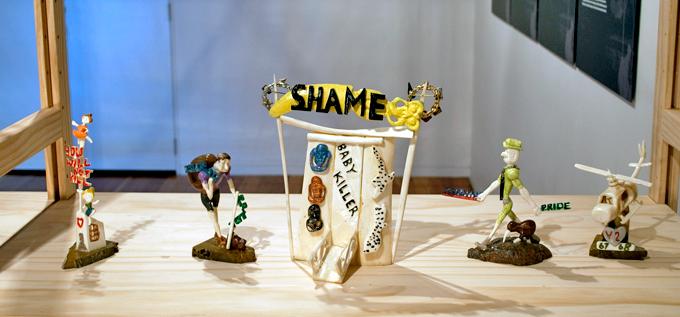
Vietnam veteran art in the Home Fires Burning exhibition at Papakura Art Gallery in Auckland, April-May 2012 (Manatu Toanga Ministry for Culture and Heritage)
The war’s true impact on veterans’ wellbeing, health, and close relationships has taken many years to emerge. Research within families now confirms that the emotional and psychological impact of war trauma can pass through generations. In the case of New Zealand’s Vietnam War, the pall of toxic exposure exacerbates emotional unease. The effects of their grandfather’s contact with insecticides and herbicides in the 1960s and 1970s are now reaching veterans’ grandchildren. Depicting and communicating their Vietnam War experience has been an integral part of the reconciliation process for many veterans. Art, poetry, painting, and sculpture are all modes of expression helping veterans and their families achieve closure and understanding. When Victor 2 Company veteran Dennis Griffin’s bone carvings – depicting his military and post-war experiences – were part of a public art exhibition, he felt “greatly moved…I hope this is the end for me and I am now free.” The last model he made is a soldier with his arms in the air, free to make peace with his past.
Toxic Exposure
A highly controversial aspect of the Vietnam War was the widespread use of herbicides by the United States military. The United States Air Force (USAF) sprayed some 75 million litres of concentrated herbicides – including 45 million litres of Agent Orange – affecting an estimated 13 per cent of South Vietnam’s land. These chemicals killed the leaves of trees in the jungle, making it easier to detect enemy positions and activities, especially from the air. The USAF also sprayed crops to deprive the enemy of food. Veterans of the war observed an increased risk of various types of cancer, while birth defects among their children were cited as evidence of the long-term harm caused by Agent Orange. After repeated denials by the New Zealand government that New Zealand areas of operations were sprayed, battle maps produced in the late 1990s by former 161 Battery commander John Masters proved New Zealand troops were in spray zones. Many veterans claim they were sprayed on operations with defoliants or insecticides, and suffer poor health as a result. The children and grandchildren of Vietnam veterans are also reporting health problems linked to toxic exposure.
Remembering Vietnam
The 1990s saw veterans reassert their right to a public profile, taking leadership roles within their local Returned Service Associations and unit reunion committees, marching in Anzac Day Parades, and finally speaking openly about their role in New Zealand’s most unpopular war. Te Manawa museum in Palmerston North staged the first exhibition of Vietnam War stories in the early 1990s, around the same time Mike Subritzky published The Vietnam Scrapbook – a compilation of anecdotes, photographs, and memories embraced by a history-starved veteran community. Many veterans have taken a creative approach to reconciling their personal experiences of war. Painting, poetry, sculpture, and prose have all been used as therapeutic and creative outlet for veterans keen to finally resolve or alleviate the war’s hold on their lives and emotions. The Vietnam War digital archive contains many examples of poetry and personal memoirs penned in a bid for closure – then offered as a means of helping all New Zealanders understand the war’s impact on those who served, and the families they came home to.
Home Fires Burning
Oral history is another way veterans opted to record their experiences of the Vietnam War and ongoing impact on their families. Professional oral historians around the country recorded more than 150 interviews over four years. These interviews are being deposited at the National Library, Wellington, for use by researchers and the public. The project also included the creation of a digital history archive where veterans, their families, and the wider community could contribute their memories and memorabilia. To mark the end of the oral history and digital archiving project, two exhibitions themed Home Fires Burning: New Zealand's Vietnam War were held in Auckland between April and June 2012. In November 2012, a permanent exhibition focusing on the Anzac relationship in Vietnam was installed at the National Vietnam Veterans Museum, Victoria.
- Tokohau Rima SamuelsTokohau Rima Samuels (1931–1975), known as Sam, was born to Rima and Evelyn Samuels on the 19th NRead more...
- 50 YEARSThe effects of fifty years is a daunting kind of feelingRead more...
- 41 Squadron Vietnam War Veterans project - Scotty WingfieldScotty Wingfield is searching for 41 Squadron’s ‘lost’ Vietnam War Veterans.Read more...
- Te Hononga - Soldier's TaleTe hononga ō Tūmatauenga ō Vietnam: We are physically, 'socially' and spiritually a connection ofRead more...

